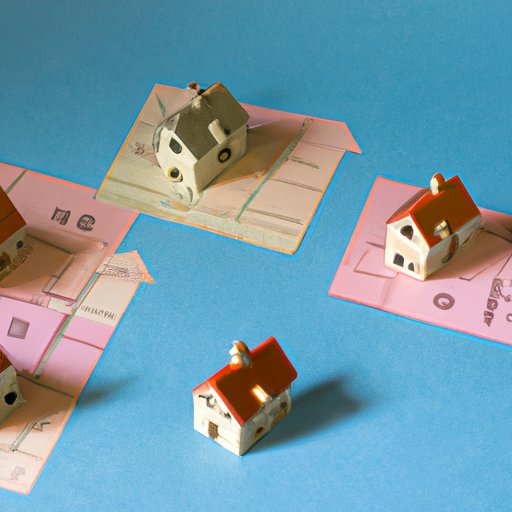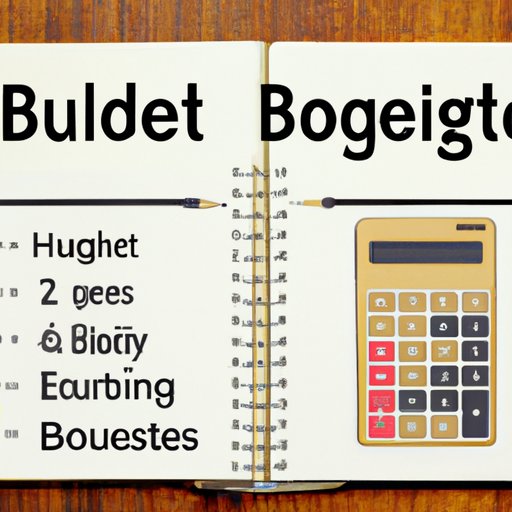
Introduction
Purchasing a house is a significant financial commitment, and determining how much to spend on a house can be challenging. Many people struggle to decide on an appropriate budget and end up either overspending or compromising on the quality of their dream home. In this article, we will provide you with the ultimate guide on how to determine your house budget and make confident decisions.

The Ultimate Guide to Determining Your House Budget
One of the most crucial steps in buying a house is setting a budget. Before you start considering houses, you need to determine how much you can afford to spend. The following are the key steps to help you calculate your budget:
- Determine your monthly income: Your monthly income is the amount you receive from your job or other sources regularly.
- Calculate your expenses: You should add together all of your monthly expenses, including bills, food, debts, and other recurring payments.
- Factor in your debt payments: If you have any outstanding loans, you’ll need to consider the amount you need to pay each month.
- Calculate your savings: To ensure that you have enough money for emergencies or additional expenses, make sure you include savings in your budget.
By adding up these figures, you can determine what you can afford to pay for your potential new home. It is essential to look at your budget realistically, so you don’t end up in financial trouble.
5 Key Factors to Consider When Setting Your House Budget
Several factors can significantly affect your house budget. Here are some of them:
- Location: The location of your home is a crucial determinant of its price. Houses in expensive suburbs and metropolitan areas usually cost more than those in the countryside or rural areas.
- Home size: The size of your home is another critical factor. Larger homes will often cost more than smaller ones.
- Home features: Amenities like a pool, a garage, or a backyard can significantly affect your home’s value and, subsequently, its affordability.
- Down payment: The amount you have saved to put towards the payment of the house affects how much mortgage you will have to take, which ultimately impacts your budget.
- Property taxes and maintenance costs: It’s essential to consider other expenses associated with ownership, like property taxes and repairs.
It’s crucial to prioritize these factors based on your personal needs and preferences. Ensure to strike a balance between the different factors and find a budget that works best for you.
How to Avoid Overspending on Your Dream Home
Everyone has a dream home that they envision. Unfortunately, it’s essential to be considerate of your budget when shopping for that home. Overspending on a home comes with its risks. For example, it could lead to a higher mortgage, maintenance costs, and more significant financial strain. Here are some tips to help you avoid overspending:
- Get pre-approved for a mortgage: This helps get a clear picture of what you can afford.
- Avoid making emotional decisions: It’s essential to take time to make the right decision rather than an impulsive one.
- Set a maximum budget limit: By setting a maximum budget limit, you can avoid falling into the trap of spending more than you planned on your home.
The Shocking Truth about Overextending Your House Budget
Going beyond your house budget can have severe consequences. Some of these include living paycheck to paycheck, sacrificing other financial goals, and even facing foreclosure. To illustrate this, consider the following:
- In 2019, more than 2.3 million Americans had their homes foreclosed, according to Statista.
- According to Business Insider, overspending on a house can lead to overcompensating for the costs by cutting down on living expenses such as food, travel, and leisure activities.
It’s crucial to live within your means and avoid overstretching your house budget. Being smart with your finances will help you meet your other financial goals while still enjoying your new home.
Balancing Your House Budget: Practical Tips for Homebuyers
As a homebuyer, you should aim to balance your budget carefully. Here are some tips to help you do that:
- Negotiate the price: Always negotiate the price of your dream home. You may find that you can get the house at a lower price.
- Get professional advice: Consulting with a financial advisor can help you understand how buying a home fits into your overall financial goals.
- Consider alternative options: You can consider other options such as buying a smaller home in a less expensive neighborhood to meet your budget.
When it comes to your house budget, flexibility, patience, and research are essential.
Finding Your Perfect House: How to Determine Your House Budget with Confidence
Determining your budget confidently is essential to avoid financial stress and remorse. Remember, setting a budget is a vital step towards buying your dream home. Consider the following:
- Make sure you account for all your expenses and prioritize the factors that are essential in a home to you.
- Stick to your budget and avoid overspending.
- Stay flexible and open to alternative options that still meet your needs and budget.
By following these guidelines, you can find your perfect home and avoid financial stress.
Conclusion
As a homebuyer, setting a budget should be a top priority. Your house budget can affect your financial health and your overall lifestyle for years to come. Now that you have read this article, we hope you feel confident in determining your house budget. Remember to prioritize your needs and goals, stay within your limits, and be flexible when necessary. We wish you the best of luck in finding your dream home!
If you find this article helpful, please share it with your friends and family.





